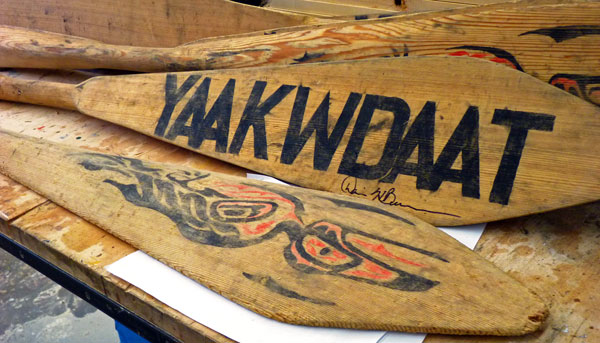
Remember the Tlingit paddlers who lost their canoes on a recent journey through Southeast? High winds and rough seas capsized the watercraft, dumping hand-carved, red cedar paddles into the ocean.
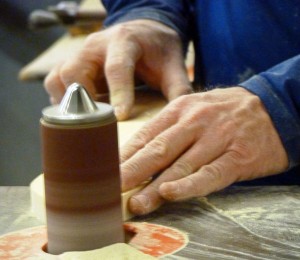
The canoes were found, and later, some of the paddles. They had a homecoming of sorts a few weeks ago in Yakutat, where they were made. The northern Southeast town is on the eastern edge of the Gulf of Alaska.
A half-dozen students sit and stand around a workbench in the Yakutat High School shop. They’re in a youth arts program that’s part of the community’s annual tern festival.
Each holds an angled cedar plank rough-cut into the shape of a ceremonial dance paddle. A pile of raw boards sits on the bench, surrounded by dark, dusty pieces of crumpled sandpaper.
While an adult volunteer uses a power tool to remove the roughest edges, the teens smooth and shape each piece by hand.
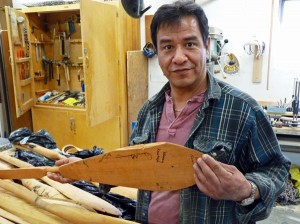
Ninth-grader Jasmine Long, working with sandpaper, already has some experience.
“They had a canoe trip recently over to Wrangell and I helped them with those paddles. And I enjoyed it so much I thought I’d come back and do this one,” she says.
“I was thinking of (painting on) an eagle, since that’s my moiety, and a bear,” she adds.
Watching the work is Doug Chilton, who led the paddle-carving effort for the Wrangell journey.
“This is an introduction stage for the next generation,” he says.
The Juneau-based master carver, who’s also the tern festival’s featured artist, moves in to advise the students. Then he steps back, letting them get a feel for the wood on their own.
“These ones are little miniature dance paddles. And we’ll introduce them to the actual usable paddles that we use. Then I can get them into a canoe. And that’s where I’m at. That’s what I love doing,” he says.
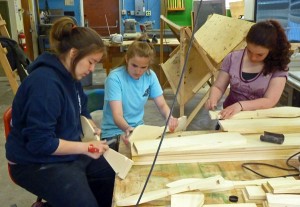 Chilton is president of the One People Canoe Society, which promotes the traditional mode of travel, along with cultural awareness and community-building.
Chilton is president of the One People Canoe Society, which promotes the traditional mode of travel, along with cultural awareness and community-building.
The recent canoe convoy from Juneau to Wrangell helped celebrate the rededication of the community’s Chief Shakes Tribal House.
That put Chilton – and some others – in the midst of some very rough seas.
“Bad weather’s bad weather. We got inside the safety boat, try to make sure everybody’s inside where it’s safe and we just kind of kept an eye on it through the window,” he says.
Two canoes and a couple dozen paddles were lost to the wind and waves.
“There’s not really a lot you can do other than just be sad. It was pretty quiet there for a while after the canoe broke loose. Once it went over we knew the paddles were gone,” he says.
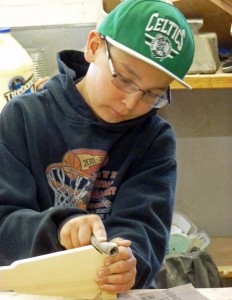
“It was heartbreaking. Our spirits got lowered quite a bit,” says Cynthia Petersen, business manager for Yak-Tat Kwaan, the Native corporation that cosponsors tern festival events.
She watches over the sanding students as she talks about being on board the ill-fated Yakutat canoe.
“A lot of us thought that our ancestors gave us so much to begin with, that they were just taking our paddles as part of it. And for eight of them to get returned, when we had eight paddlers on the journey from Yakutat, was amazing,” Petersen says.
And there the paddles are, one broken and others battered – laid out on a nearby shop workbench.
Chilton walks over to the pile.
“This is one of the paddles that was returned to us. And you can see how the edge is busted off. The Fish and Game officer that brought these to us said they had to wait for this one because there was a bear chewing on it,” he says.
More than a dozen Yakutat paddles are still missing. But those recovered have some time in the water.
Chilton and others in the One People Canoe Society head to Washington’s Olympic Peninsula later this summer for what’s called the Intertribal Canoe Journey and Potlatch.
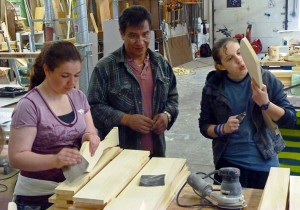
After that, the paddles return to Yakutat, and the sponsors who helped fund the Wrangell trip.
“It’s interesting. They went on their own journey and they came back,” Chilton says.
Back in the high school shop, Jasmine Long continues smoothing the edges of her ceremonial dance paddle. She’s been involved in dance groups in the past and is working on returning.
“I’ve been going to the practices and I’ve been trying to get back into it.”
She says it feels good to create a paddle she’ll use.
Ed Schoenfeld is Regional News Director for CoastAlaska, a consortium of public radio stations in Ketchikan, Juneau, Sitka, Petersburg and Wrangell.
He primarily covers Southeast Alaska regional topics, including the state ferry system, transboundary mining, the Tongass National Forest and Native corporations and issues.
He has also worked as a manager, editor and reporter for the Juneau Empire newspaper and Juneau public radio station KTOO. He’s also reported for commercial station KINY in Juneau and public stations KPFA in Berkley, WYSO in Yellow Springs, Ohio, and WUHY in Philadelphia. He’s lived in Alaska since 1979 and is a contributor to Alaska Public Radio Network newscasts, the Northwest (Public Radio) News Network and National Native News. He is a board member of the Alaska Press Club. Originally from Cleveland, Ohio, he lives in Douglas.




